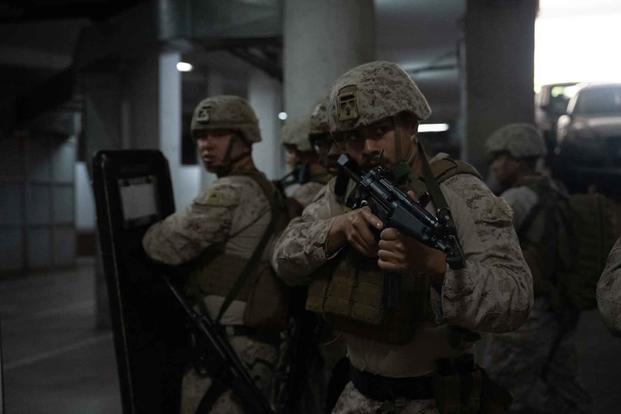The Marine Corps has sent a special response unit to Haiti to supplement security, allow non-emergency personnel to depart and relieve Marines previously manning posts at the U.S. Embassy in Port-au-Prince, the capital of the country that has descended into turmoil amid widespread gang violence.
A Marine Fleet Anti-Terrorism Security Team, or FAST, unit arrived in the capital, according to a statement from U.S. Southern Command on Wednesday, though it did not specify when. The U.S. military previously conducted an airlift evacuation of non-essential personnel from the embassy, which is still open but limited in its capacity, the command said.
U.S. Southern Command said that the need for the FAST came at the request of the State Department, and that it "is prepared with a wide range of contingency plans to ensure the safety and security of U.S. citizens in Haiti."
Read Next: Soldiers Said Goodbye to Loved Ones as Army Ships Set Sail to Gaza to Build Pier for Aid Delivery
FAST units fall under the Corps' Security Force Regiment, which provides a dedicated security and anti-terrorism force that is designed for speedy deployment to naval and sensitive government sites abroad that need an armed presence.
The Pentagon doubled funding for its multinational security support mission in Haiti this week, according to U.S. Southern Command, and is working with the Haitian National Police "to restore security in Haiti," a spokesperson said. That support could include planning assistance, information sharing, airlift and medical support.
On Sunday, U.S. Southern Command said the U.S. military beefed up security at the embassy and conducted evacuations. It added that no Haitians were aboard the flights out of the country.
Violence in Haiti ramped up over the weekend across the country's capital, as heavily armed gangs swarmed the National Palace and tried to take over the interior ministry, setting part of it ablaze with gas bombs. Haiti has seen an explosion of gang violence over the last few years after the 2021 assassination of Haitian President Jovenel Moise by still-unidentified gunmen.
His successor, acting Prime Minister Ariel Henry, traveled recently to Kenya, hoping for the United Nations-backed deployment of a police force to fight the gangs. But a Kenyan court ruled in January that such a deployment would be unconstitutional, and Henry has been unable to return to Haiti since. He arrived in Puerto Rico on Tuesday, after neighboring Dominican Republic closed its land borders and said it would not accept the exiled president.
Henry said Tuesday that he plans to resign once a presidential transition council is created, according to The Associated Press.
The Marine Corps is heavily involved with embassy security operations in Haiti. In general, Marine security guards, or MSGs, are tasked with defending personnel, property and sensitive documents in more than 180 detachments around the world, Col. Kelly Frushour, the commanding officer of the Marine Corps Embassy Security Group, told Military.com.
"Deterrence is the main role of a Marine security guard," she said. "Marines train hard to dissuade adversaries and would-be adversaries from attempting to breach the security of the places they protect. For the vast majority of Marine security guards, their skills will only be tested in training. For those MSGs who are tested in reality, they are well-led, well-trained, well-armed and ready."
She said MSG detachments are typically led by a staff noncommissioned officer who works at the direction of a diplomatic security service regional security officer. That regional security officer falls under the State Department structure of command and directs the MSGs in security tasks at the embassy, a standard procedure "to minimize the footprint and reduce the amount of sensitive material remaining," Frushour said if an evacuation occurs.
Military.com reached out to the Marine Corps specifically for comment on the deployment of the FAST unit to Haiti and its mission there.
"Marines are always ready to deploy," Maj. Jim Stenger, a spokesperson for the Marine Corps, said in a response.
Related: US Forces Fly In to Beef Up Security at Embassy in Haiti and Evacuate Nonessential Personnel














